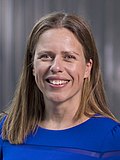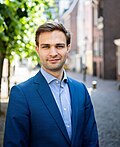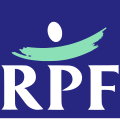Christian Union (Netherlands)
Christian Union ChristenUnie | ||
|---|---|---|
King's Commissioners 1 / 12 | ||
| Benelux Parliament | 2 / 21 | |
| Website | ||
| www | ||
The Christian Union (Dutch: ChristenUnie [ˈkrɪs.tənˈy.ni], CU) is a Christian-democratic[10] political party in the Netherlands. The CU is a centrist party, maintaining more progressive stances on economic, immigration and environmental issues[11][12][13] while holding more socially conservative positions on issues such as abortion and euthanasia. The party describes itself as "social Christian".[14]
The CU was founded in 2000 as a merger of the
Primarily a
History
Before 2000
The Netherlands has a long tradition of small orthodox or conservative Protestant (i.e., mostly
| Part of the Politics series |
![Azure, billetty Or a lion with a coronet Or armed and langued Gules holding in his dexter paw a sword Argent hilted Or and in the sinister paw seven arrows Argent pointed and bound together Or. [The seven arrows stand for the seven provinces of the Union of Utrecht.] The shield is crowned with the (Dutch) royal crown and supported by two lions Or armed and langued gules. They stand on a scroll Azure with the text (Or) "Je Maintiendrai" (French for "I will maintain".)](http://upload.wikimedia.org/wikipedia/commons/thumb/8/8f/State_coat_of_arms_of_the_Netherlands.svg/150px-State_coat_of_arms_of_the_Netherlands.svg.png) |
|---|
|
|
The RPF explicitly stated in its manifesto of principles that it sought to unite all reformed parties in the Netherlands. However, the GPV and SGP were somewhat less receptive. The GPV was only open to a specific current in reformed Protestantism, namely the Reformed Churches (Liberated), and did not wish to cooperate with non-'liberated' reformed: it had rejected on religious grounds the entry of the group that in the 1970s was to become the RPF. The SGP had rejected cooperation with these parties because they had female members; the SGP consistently rejected female suffrage until 2006. The RPF, GPV and SGP were testimonial parties, which chose to voice their concerns about government policy, while acknowledging that they were not big enough to force their opinion upon others.
In 1984, however, the three parties cooperated in the European election and presented a common list in order to enter the European Parliament. In the 1989 general election they formed an electoral alliance in order to enhance their chances of obtaining seats. In 1995 informal talks were opened between the three parties. The GPV had opened itself to non-liberated members, but the SGP not to women. The discussions with the SGP were broken off and the GPV and RPF continued together. For a long time the GPV was not willing to enter a major internal debate with the RPF, which also performed better electorally; it had won three seats in the 1998 election, while the GPV received only two. From 1998 the two parliamentary parties cooperated with each other, held common meetings and appointed common spokespersons. In 1999 a group called "Transformatie" (Transformation) was set up by young people from both parties in reaction to the slow cooperation process: they tried to intensify the debate about cooperation. In the same year the cooperation talks were formalised and intensified, leading to the foundation of the Christian Union.
2000–present

The Christian Union was founded in January 2000 as an alliance between the RPF and GPV. Later in that year, their youth organisations, GPJC and RPFJ, fused completely, presenting an example to their mother organisations. In 2001, they formed a common
In the
After the collapse of the Balkenende cabinet, the Christian Union no longer had representatives in government; Rouvoet returned to parliament as leader of the CU parliamentary group until he left politics in April/May 2011. Arie Slob succeeded him as the party leader.

In October 2013, the Second Rutte cabinet (VVD and PvdA), lacking a majority in the Senate, reached a budgetary agreement with the CU, the Reformed Political Party (SGP) and Democrats 66 (D66). This occasional coalition is nicknamed "purple plus the Bible" (Paars met de Bijbel) as it includes the secular parties VVD, PvdA and D66 plus the religious-orientated parties Christian Union and SGP. The term "purple plus the Bible" had already been used in February that year, when the same parties reached an agreement on modernising the housing market. Although the cabinet is quite unpopular and the VVD and PvdA lost a lot of municipal seats during the municipal elections of 19 March 2014, the parties that give tactical support to the minority government of VVD and PvdA, D66, CU and SGP won a lot of seats.
After the
Following the 2019 European elections, the Christian Union left the European Conservatives and Reformists (ECR) group in the European Parliament (of which it had been a founding member) arguing that the ECR was moving too far to the right by including MEPs far-right parties such as the Dutch Forum for Democracy and the Sweden Democrats. The party instead joined the European People's Party Group.
In January 2023, Mirjam Bikker succeeded Segers as the party leader.[15] During the 2023 Dutch general election the Christian Union lost two of their five seats, getting 2% of the votes.[16]
Ideology
The CU describes itself as a Christian social party. The party has its roots in orthodox Protestant (i.e. mostly
Some of CU's
- Facilitation by government of a one-earner model, allowing one parent, usually the wife, to stay at home and take care of the children.
- Society should cherish its collective moments of rest, and preferably leave Sunday a day of rest.
- Abortion and euthanasia-practices should be reduced and eventually replaced by alternatives, such as care of women with unwanted pregnancies and palliative care.
- The Dutch policy of toleration of soft drugs should be abandoned.
- Combatting child pornography and prostitution.
- Defending the freedom of education (that is, to found religious schools), because of sphere sovereignty.
- The Netherlands should remain an independent political entity within the European Union.
- Limiting the use of genetic manipulation.
More centre-left policies include:
- Public services of education, health care and social security should remain state run, but on a smaller scale than is presently the case.
- Increased budgets for poverty in the global south.
- A more open policy towards asylum seekers, especially those who are persecuted for religious reasons.
- A green energy, the Dutch branch of Greenpeace termed CU the greenest political party in 2006.[18]
Social issues
The CU describes itself as "Christelijk-sociaal" (Social Christian) and explicitly distance themselves from the labels
The party supports Dutch membership of the European Union to ensure peace and prosperity, and to counter the influence of Russia and China, while simultaneously being critical of several EU policies which it claims are undemocratic and "mainly benefits large companies and the upper middle classes." The CU instead calls for more transparency within the EU, for domestic decision making of EU member states to be respected and wants reforms made to the Eurozone. The CU is also against the accession of Turkey to the European Union.[21]
Electoral results
This table shows the CU's results in elections to the House of Representatives, Senate, European Parliament and States-Provincial, as well as the party's political leadership: the fractievoorzitter is the chair of the parliamentary party and the lead candidate is the party's top candidate in the general election; these posts are normally taken by the party's leader. It also listed whether the CU was in government at the time. For further information the membership figure and the name of the party chairman of the CU are listed.
House of Representatives
| Election | Lead candidate | Votes | % | Seats | +/– | Government |
|---|---|---|---|---|---|---|
| 2002 | Kars Veling | 240,953 | 2.54 (#8) | 4 / 150
|
Opposition | |
| 2003 | André Rouvoet | 204,649 | 2.12 (#8) | 3 / 150
|
Opposition | |
| 2006 | 390,969 | 3.97 (#6) | 6 / 150
|
Coalition | ||
| 2010 | 305,094 | 3.24 (#8) | 5 / 150
|
Opposition | ||
| 2012 | Arie Slob | 294,586 | 3.13 (#8) | 5 / 150
|
Opposition | |
| 2017 | Gert-Jan Segers | 356,271 | 3.39 (#8) | 5 / 150
|
Coalition | |
| 2021 | 350,523 | 3.37 (#8) | 5 / 150
|
Coalition | ||
| 2023 | Mirjam Bikker | 212,532 | 2.04 (#13) | 3 / 150
|
Opposition |
Senate
| Election | Votes | % | Seats | +/– |
|---|---|---|---|---|
| 1999 | 4 / 75
|
|||
| 2003 | 2 / 75
|
|||
| 2007 | 4 / 75
|
|||
| 2011 | 2 / 75
|
|||
| 2015 | 32 | 3 / 75
|
||
| 2019 | 33 | 5.03 | 4 / 75
|
|
| 2023 | 23 | 3.73 | 3 / 75
|
European Parliament
| Election | List | Votes | % | Seats | +/– | Notes |
|---|---|---|---|---|---|---|
| 2004 | List | 279,880 | 5.87 | 2 / 27
|
New | In combination with Reformed Political Party[22] |
| 2009 | List | 310,540 | 6.82 | 2 / 25
|
In combination with Reformed Political Party[23] | |
| 2014 | List | 364,843 | 7.67 | 2 / 26
|
In combination with Reformed Political Party[24] | |
| 2019 | List | 375,660 | 7.67 | 2 / 26
|
In combination with Reformed Political Party[25] | |
| 2024 | List | 180,060 | 2.89 | 0 / 31
|
[26] |
Provincial
This article needs to be updated. (June 2015) |
Since the
The following table below shows the election results of the most recent 2015 provincial election in each province. It shows the areas where the ChristenUnie is strong, namely Groningen, Overijssel, Gelderland and Flevoland, provinces which have a traditional large conservative Protestant population. The party is especially weak in the southern Catholic provinces of Limburg and North Brabant and the more secular North Holland province.
| Province | Votes (%) | Result (seats) |
|---|---|---|
| Drenthe | 6.43 | 3 |
| Flevoland | 7.27 | 3 |
| Friesland* | 7.43 | 3 |
| Gelderland | 6.12 | 4 |
| Groningen | 8.75 | 4 |
| Limburg | N/A | 0 |
| North Brabant* | 2.03 | 1 |
| North Holland* | 2.70 | 1 |
| Overijssel | 8.37 | 4 |
| South Holland | 4.80 | 3 |
| Utrecht | 6.16 | 3 |
| Zeeland | 5.73 | 2 |
* result of combined CU/SGP lists; ** members of the CU in combined CU/SGP parliamentary parties.
Municipalities
This article needs to be updated. (June 2015) |
Eight of the 414
Representation
Members of the cabinet

From 2007 to 2010 the CU supplied two ministers and one state secretary in the fourth Balkenende cabinet:
- André Rouvoet, Deputy Prime Minister and Minister without portfolio for Youth and Family Affairs
- Eimert van Middelkoop, Minister of Defence
- Tineke Huizinga, State Secretary and Minister of Environment and Spatial Planning
Since 2017, the CU has once again supplied two ministers and one state secretary in the third Rutte cabinet:
- Carola Schouten, Deputy Prime Minister and Minister of Agriculture, Nature and Food Quality
- Arie Slob, Minister for Primary Education, Secondary Education and Media
- Paul Blokhuis, State Secretary for Health, Welfare and Sports
Members of the Fourth Rutte cabinet
| Portrait | Name | Position | Assumed office |
|---|---|---|---|

|
Carola Schouten (born 1977) |
Deputy Prime Minister | 26 October 2017 |
Civic Engagement
• Pensions |
10 January 2022 | ||

|
Piet Adema (born 1964) |
Minister of Agriculture, Nature and Food Quality
|
4 October 2022 |

|
Maarten van Ooijen (born 1990) |
10 January 2022 |
Members of the House of Representatives
Members of the Senate
Members of the European Parliament
| Part of a series on |
| Christian democracy |
|---|
 |
|
|
After the
Electorate
The CU was supported by orthodox
The party is also drawing support from a growing number of conservative
The party's congress, held on 13 June 2015, replaced the Heidelberg Catechism with Nicean Creed.
Organisation
Leadership
|
|
Organisational structure
The highest body in the CU is the Union Congress, formed by delegates from the municipal branches. It appoints the party board and decides the order of the candidates on the lists for elections to the Senate, House of Representatives and European Parliament and has the final say over the party program. A member congress has an important role in the formation of the CU's political direction.
Members
The CU currently has 25,170 members (as of 1 January 2019). They are organised in over 200 municipal branches.
Linked organisations
The youth organisation of the party is PerspectieF which was formed as a fusion of the two youth organisations of the CU's predecessors the GPJC and RPFJ. The party publishes the HandSchrift (HandWriting) six times a year. The party's scientific institute is the Mr. Groen van Prinsterer Foundation, which publishes the DenkWijzer (ThoughtWiser). The women's organisation is Inclusief.
The CU participates in the Netherlands Institute for Multiparty Democracy, a democracy assistance organisation of seven Dutch political parties.
International organisations
Internationally the CU is a member of the European Christian Political Movement. Its MEPs were seated in the European Conservatives and Reformists group. Until 2019 when the CU joined the EPP Group
Orthodox-Protestant (pillarised) organisations
The CU still has ideological strong links with so-called pillarised organisations. Together with conservative Protestant schools, papers like the Nederlands Dagblad and the Reformatorisch Dagblad, the Protestant broadcaster Evangelische Omroep, several Reformed churches they constitute the conservative or orthodox Reformed pillar (Dutch zuil). While all four of the traditional Dutch pillars (socialists, liberals, Protestants and Catholics) have broken down since the 1960s, the orthodox reformed pillar has actually strengthened in reaction to the process of secularisation.
Relationships to other parties
The Christian Union had been in the opposition until 2006. It has good relations with the orthodox
International comparisons
The Evangelical People's Party of Switzerland is nearest to the Christian Union as a conservative Protestant party that is left wing in social matters, conservative in ethical matters and critical of the European Union.
Notes
- Reformed Churches (Liberated) or other more conservative forms of Protestantism, such as the certain branches of Baptism like Reformed and Primitive Baptists. It is unrelated to the Eastern Orthodox Church.
- ^ The Reformed Political Party kept its seat with a separate list.
References
- ^ "Ledentallen Nederlandse politieke partijen per 1 januari 2024" [Membership of Dutch political parties as of 1 January 2024]. University of Groningen (in Dutch). Documentation Centre Dutch Political Parties. 28 February 2024. Retrieved 28 February 2024.
- ^ a b c Nordsieck, Wolfram (2021). "Netherlands". Parties and Elections in Europe. Retrieved 24 March 2021.
- ^ Terry, Chris (11 May 2014). "ChristianUnion (CU) & Political Reformed Party (SGP)". The Democratic Society. Archived from the original on 13 December 2019.
- ^ "Party watch: ChristenUnie focus on health, families and poverty". Dutch News (in Dutch). Retrieved 19 November 2023.
- ^ Jort Statema; Paul Aarts. "The Netherlands: Follow Washington, Be a Good European". In Timo Behr; Teija Tiilikainen (eds.). Northern Europe and the Making of the EU's Mediterranean and Middle East Policies. note on p. 237.
- ^ "Netherlands – Political parties". European Election Database. Norwegian Centre for Research Data. Retrieved 23 December 2019.
- ^ Oomkes, Lex (15 August 2012). "Uitersten in politiek landschap winnen terrein". Trouw (in Dutch). Retrieved 31 July 2020.
- ^ Rudy B. Andeweg; Galen A. Irwin (2014). Governance and Politics of the Netherlands (4th ed.). Palgrave Macmillan. p. 74.
- ^ "Politieke fracties". Benelux Parliament (in Dutch). Retrieved 8 August 2023.
- ISBN 978-1-137-31484-0.
- ^ ISBN 978-1-4422-5593-7.
- Parlement.com.
- ^ Rudy B. Andeweg; Galen A. Irwin (2014). Governance and Politics of the Netherlands (4th ed.). Palgrave Macmillan. pp. 74, 78.
- ^ Parlement & Politiek
- ^ "Wie is Mirjam Bikker, de nieuwe ChristenUnie-leider? 'Slim en betrouwbaar'". RTL Nieuws (in Dutch). 2023-01-13. Retrieved 2023-12-03.
- ^ "NOS - Uitslagen Tweede Kamerverkiezingen 2023". app.nos.nl (in Dutch). Retrieved 2023-12-03.
- ^ "Standpunten". ChristenUnie.nl.
- ^ (in Dutch) ChristenUnie op 1 in energiebarometer Greenpeace Christian Union
- ^ Andeweg, R. and G. Irwin Politics and Governance in the Netherlands, Basingstoke (Palgrave) p.49
- ^ (in Dutch) CU is niet meer 'christelijk-sociaal' Trouw
- ^ "Europa - ChristenUnie.nl".
- ^ "Kiesraad: Europees Parlement 10 juni 2004" (in Dutch). Kiesraad. Retrieved 19 June 2019.
- ^ "Kiesraad: Europees Parlement 4 juni 2009" (in Dutch). Kiesraad. Retrieved 19 June 2019.
- ^ "Kiesraad: Europees Parlement 22 mei 2014" (in Dutch). Kiesraad. Retrieved 19 June 2019.
- ^ "Kiesraad: Europees Parlement 23 mei 2019" (in Dutch). Kiesraad. 4 June 2019. Retrieved 19 June 2019.
- ^ "Proces-verbaal centraal stembureau uitslag verkiezing Europees Parlement Model P22-1" [Central electoral council report of the results of the election of the European Parliament Model P22-1] (PDF). Dutch Electoral Council (in Dutch). 19 June 2024. pp. 2, 4, 8. Retrieved 19 June 2024.
- ^ "Provinciale Staten 18 maart 2015". Kiesraad.
- Parlement & Politiek(in Dutch). Retrieved 27 May 2018.
- Parlement & Politiek(in Dutch). Retrieved 27 May 2018.
External links
![]() Media related to ChristenUnie at Wikimedia Commons
Media related to ChristenUnie at Wikimedia Commons


